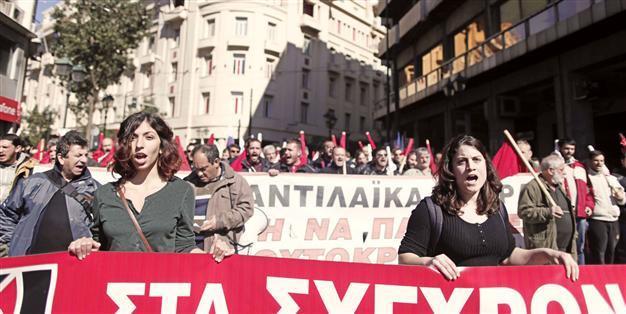Greek unions organize nationwide strike against austerity measures
ATHENS - Reuters

Members of pro-communist union PAME shout slogans during a protest in this photo. Thousands of anti-austerity demonstrators took to the streets of Athens as unions staged a general strike. AP photo
Greek workers held a nationwide strike against wage cuts and high taxes yesterday, keeping ferries stuck in ports, schools shut and hospitals with only emergency staff.
The two biggest labour unions brought much of crisis-hit Greece to a standstill during the 24-hour protest against austerity policies which they say deepen the hardship of people struggling through the country’s worst peacetime downturn.
Representing 2.5 million workers, the unions have gone on strike repeatedly since a debt crisis erupted in late 2009, testing the government’s will to impose the painful conditions of an international bailout in the face of growing public anger.
“Today’s strike is a new effort to get rid of the bailout deal and those who take advantage of the people and bring only misery,” said Ilias Iliopoulos, secretary general of the ADEDY public sector union which is organising the walkout with private sector union GSEE.
Prime Minister Antonis Samaras’s eight-month-old coalition government has been eager to show it will implement reforms it promised the European Union and International Monetary Fund, which have bailed Athens out twice with over 200 billion euros.
It has taken a tough line on striking workers, invoking emergency laws twice this year to order seamen and subway workers back to their jobs after week-long walkouts that paralysed public transport in Athensand led to food shortages on islands.
But in a sign it may be buckling under pressure, it announced on Feb. 18 it would not fire almost 1,900 civil servants earmarked for possible dismissal, despite promising foreign lenders it would seek to cut the public payroll.
Greece secured bailout funds in December, ending months of uncertainty over the country’s future in the euro zone, and analysts said this had created expectations among Greeks that things would improve for them personally.
“If these expectations are not satisfied by the summer, then whatever is left of the working class will respond with more protests,” said Costas Panagopoulos, head of Alco pollsters.
Greece’s economy has shrunk by about 20 percent since the recession began in 2008, with its downturn exacerbated by fiscal austerity demanded by its international lenders to shore up public finances and attain a primary budget surplus in 2013.
Six years of recession and three of austerity have tripled the rate of unemployment to 27 percent. More than 60 percent of young workers are jobless.
Hollande’s visit
French President François Hollande used a visit to hard-hit Greece on Feb. 19 to press his pro-growth agenda, saying fiscal reform could not be achieved by austerity alone.
He offered to help the twice bailed-out country - in a deep economic depression - with privatizations, tourism and a public sector overhaul.
“We must make sure that growth and jobs come back in Greece,” Hollande said. “We need more growth in Europe. That’s how we’ll reach our public deficit reduction goals.”
Athens, whose euro zone partners and the International Monetary Fund unlocked bailout aid in December after a six-month stalemate, hopes Hollande’s one-day visit will spur badly-needed investments to ease record-high unemployment.
The two leaders also signed an agreement to boost the flow of French tourists to Greece.
With Greek journalists on a 24-hour, anti-austerity strike, Hollande’s visit was not getting extensive local coverage.
